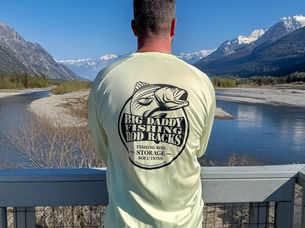top of page
BIG DADDY BLOG


Free National Park Days 2025 (U.S. National Park Services)
f you've been dreaming of exploring America's stunning national parks without breaking the bank, you're in luck! In 2025, all U.S. National Park Service sites that charge an entrance fee will offer free admission on select dates.
3 days ago2 min read


Spring Fishing Tips: What’s Biting & When
Whether you're hitting your favorite lake, river, or shoreline, understanding what species are biting and when can make all the difference.
Apr 93 min read

The Best Kept Secret Spots to Reel in Big Catches in NJ!
With its diverse waterways and vibrant fishing communities, NJ offers the perfect backdrop for anglers of all skill levels.
Apr 24 min read


Bagging Big Ones: Mastering Springtime Tarpon Fishing in Florida
Springtime in Florida is an exciting time for anglers eager to catch tarpon, a fish known for its powerful leaps and fighting spirit.
Mar 264 min read


Exploring Abandoned Places: The Do’s and Don’ts
Knowing the do's and don’ts of exploring these forgotten corners can make your adventure both rewarding and safe.
Mar 194 min read


Spring Fishing in New Jersey - What to Catch and When
As the days get longer and the weather warms up, spring in Southern New Jersey brings fresh opportunities for anglers to reel in some fish.
Mar 123 min read


Big Daddy Life is Returning to the NJ Saltwater Fishing Expo in Edison, New Jersey!
We’ve got some exciting news! Big Daddy Life is heading back to Edison, NJ for the Saltwater Fishing Expo, happening from March 14-16, 2025
Mar 52 min read


How to Prep for Sudden Weather Changes on Your Trip
Handling sudden weather changes can make or break your trip. Stay safe and prepared with these tips.
Feb 262 min read

Big Daddy Life Just Got a Fresh New Look!
Big Daddy Life Just Got a Fresh New Look! Explore our New Site.
Feb 191 min read


The Art of Fly Fishing for Trout
Fly fishing is often seen as one of the most peaceful and rewarding ways to fish, with its focus on precision, patience, and connection...
Feb 122 min read


Important Knots Every Outdoorsman and Fisherman Should Know
Here are some essential knots, each useful for different outdoor activities like fishing, camping, or boating.
Feb 56 min read


The Call of the Wild
For those who feel the call of the wild, nature and travel aren’t just activities—they’re a way of life.
Jan 293 min read


Limited Edition Rod Rack Colors
Introducing the same PVC 10-Holder Big Daddy Fishing Rod Racks you know and love—now available in three exclusive, limited edition wood...
Jan 221 min read

How to Plan the Ultimate Outdoor Adventure on a Budget
Plan the ultimate outdoor adventure on a budget with tips on affordable gear, destinations, and money-saving strategies.
Jan 153 min read


Baitcasting Reels vs. Spinning Reels: Pros and Cons for Bass Fishing
When it comes to bass fishing, choosing the right reel can make all the difference. Both baitcasting reels and spinning reels have their...
Jan 22 min read


Outdoor Bucket List Locations for 2025: Adventures to Make This Year Unforgettable
Discover the top outdoor bucket list locations for 2025, from hiking to stargazing, and start planning your next adventure today!
Dec 26, 20242 min read

Winter Camping Tips for Staying Warm and Safe
Winter camping offers a unique opportunity to experience nature's beauty in its most serene and quiet form.
Dec 18, 20242 min read


Top 5 Perfect Gifts for Anglers
Don't know what to get the angler in your life? Check out our top five fishing gifts.
Dec 11, 20242 min read


Top Holiday Outdoor Locations in the USA: Festive Events and Attractions
These top spots will make your holiday season unforgettable.
Dec 4, 20243 min read


Must-See Frozen Waterfalls to Visit This Winter
Follow along as we explore some of the most impressive frozen U.S. waterfalls guaranteed to be at the top of your bucket list this winter.
Nov 27, 20243 min read
bottom of page
